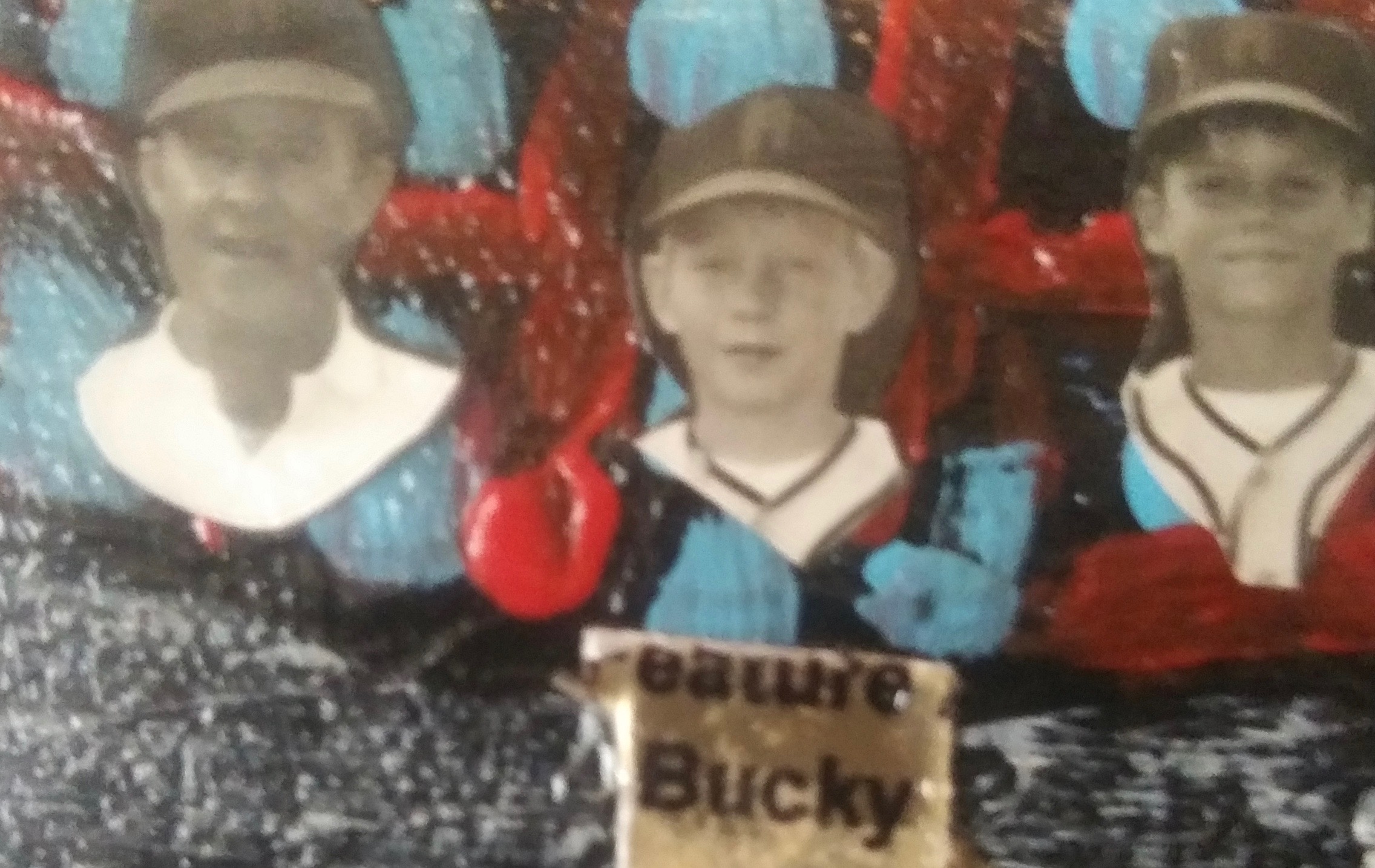I Is An Other
By Bucky McMahon
i.
“The souls of the damned are not barred from this world. Where would they go? Hell, we are told in the Gospels, but we know very little of Hell. Nor is sin perishable, despite forgiveness of the sinner. I believe—truly, unfortunately I have seen—how it passes down the generations, presumably to the end of time. But tell me, anyone, what is the origin of sin?”
Thus spoke Father Bergin—Fadder Bear-gun—florid with whiskey (or so we imagined), lighting his umpteenth cigarette, pronouncing “unfortunately” as “un-fart-unately” in his thick Irish brogue. It was sixth period religion, the final class of the day, and the day was Friday, that grand gateway to the glorious weekend. The Fadder was performing his usual magic trick: Stopping time. In the priest’s Tar-Baby theology, all things were stuck to God in eternity, our souls captive sprites like prehistoric flies embedded in amber.
Outside the jalousie windows a pristine September afternoon beckoned—the beach, the boardwalk, basketball, or sheer delicious idleness—while inside a miasmic boredom and despair afflicted the classroom clock. Our friend and ally, moon-faced and mustachioed, it had nobly tick-tocked to 23 to 3, where it seemed to have expired.
Father Bergin squinted at us through blue smoke, waiting us out, and we stared back at him, faces streaked with the powder-fine black dirt of the patchy north Florida playground. No doubt we looked like the little demons we were. The longer the silence persisted, the greater danger there was of spontaneous convulsions of mirth. And then somebody would get pinched.
The Fadder was probably not much older than 30. The girls thought he was handsome, with his black hair slicked back and perpetual five o’clock shadow darkening his wolfish cheekbones, and of course the Irish brogue. His principal pedagogical tool was sarcasm drenched with contempt, and it mostly worked. Still, despite the threat of humiliation, it was not always possible for us to get through class without succumbing to desperate silent laughter. Infallibly, like a dog attuned to a high-pitched whistle, Father Bergin would close upon the trembling imbecile in a few swift, cassock-swishing strides and pinch—an ear, a cheek, a bicep. It was often a sustained pinch, awkward for all involved except the Fadder himself, whose anger could be seen draining away with the pressure. I have little doubt he was a classic sadist, and he may have recognized in me an incipient masochist. We boys of the sixth grade called him “Dracular,” in our best ironic Gomer Pyle accents.
“We boys,” I say. I mean our little clique, the social elite of that tiny barbaric society, altar boys and patrol boys: Steve, Roger, Pat, Bobby, and me, though we called each other by botched or parodic versions of our last names. Jay Rat. Bull. Hill o’ Gas. Da Tube. I was Man. Pronounced “May-in.” It was a time of peak hilarity. We laughed at everything, respected nothing. We knew practically nothing as well, except that Immaculate Conception Catholic School was founded on two whopping lies: that there was no sex, and no death. Not that we needed a philosophy to act like jackasses. Whatever hijinks or inanities we thought up we performed, for the pleasure of belly laughs. We were wise in our way, perhaps, attuned to the cosmic joke. We didn’t laugh at the world so much as the world laughed at itself through us.
“What is the origin of sin?” the priest repeated, and now his eyes focused on me. I looked down at my desktop and hoped he wouldn’t call on me, though I knew he would. I was his star pupil, probably because of my awakening presentiment of doom, the gateway to theology. I had begun to read Jack London and Edgar Allan Poe. London and his freezing prospectors and starving wolf-dogs gave you the facts; Poe probed the dark underpinnings of nature red in tooth and claw, the universe’s uncanny motivation, so to speak. In combination, the world view was of a dog fight in a grave. Dogs that suffered but couldn’t die. A grave with no graspable dimensions.
“Michael?” Father Bergin said. I felt the desk behind me bump mine: Jay Rat beginning to lose it. My reputation as a smart aleck was at stake, and maybe worth a pinch, though I wasn’t an outright defier of authority. I thought “disobedience” was the answer he was looking for, “Satan” acceptable, also “Eve.” We had wrestled, the Fadder and I, more than once, during the eternal sixth period, over free will and predestination. I knew all about the Great Loophole: How God made everything (except evil), was everything (except evil), and knew everything (except how you would choose when tempted with evil). Why? Because the poor Commandant wanted you to choose to love Him. He would not coerce. Not really. Hell was just backup.
Who could believe any of that nonsense? But maybe nobody did. Maybe they all pretended, and I alone was failing to dissemble properly. I was years from Schrödinger’s Cat, how one might believe and not believe, in a reality that was and wasn’t.
“Well, Michael,” Father Bergin said again. “What is the origin of sin?”
“God?” I asked.
The priest scanned the room for titterers. Then he approached with thumb and forefinger in pincer position. I winced, but he only gave my ear a gentle tug, patted my cheek, and winked. I knew he knew I knew he knew I was jerking his scapular. But I realized in that moment that the gang wouldn’t know. They’d think I’d given the Fadder what he wanted to hear, the right answer instead of the provocation I’d intended: the Monist Heresy—that if the Big Guy wanted to own all His omnis, He’d be stuck with sin on his hands as well.
And now I was truly one of the damned, in the shit with my boys for brownnosing Dracular, and I would have to do something really stupid to make up for it.
ii.
Indeed, in sixth grade it was vitally important to not do well, or do good. In that regard, certain disasters occurred. The first was that I won a AAA traffic safety poster contest I’d entered for a school assignment. According to my older brother Patrick, speculating years later, Momma made all of our award-winning posters; she had been, after all, a copy editor for newspapers and couldn’t resist. This may be, but then why do I remember the slogan as if it were branded on my brain: “Walk Right, On the Left, Facing Traffic.” These seven soldierly words, while they don’t raise the hairs on the back of the neck, still feel right, even inevitable. The self-consciously ungrammatical opening; the surprising reversal (which forgives the error); the confrontational conclusion—boom, boom, boom—three sledgehammer blows of reason, a tocsin that could not fail to educate the hapless pedestrian, and more importantly impress the godlike judges of Triple-A. I didn’t know if my words would save lives, but they would surely unnerve rival sloganeers. The graphics consisted of a pair of horned headlights bearing down on a startled silhouette (on the left) who cast a long slashing shadow; the two antagonists, car and pedestrian, confined to a claustrophobic expressionistic space, unconsciously referenced both the minotaur in its labyrinth and “The Cabinet of Dr. Caligari.”
As a reward, or rather consequence, of victory, Momma took me to Tots-to-Teens on Third Street, where I was allowed to pick out my own outfit for the photo shoot for the Beaches Leader, the local paper. I was cooed over embarrassingly, the little artist, by the owners of that youth haberdashery, as I was drawn self-destructively to a pair of bright yellow shorts and paisley shirt which even a clown of the utmost accomplishment couldn’t have pulled off. The photo of me and my fellow winner—Harlequin and Columbine—survived a long time in the family archives and is now hopefully lost. I appeared at my most vulnerably emaciated, knock-kneed, dwarfed by my glad rags, as grotesque as feared. My fellow awardee was a tiny blond girl with an unfortunate white bandage eyepatch under cat’s eye glasses. Of her winning poster I recall nothing at all; such is the artistic ego.
But a bonus disaster—beyond the premonition that I would never cut a dashing figure in fashionable circles, and that all efforts in that direction would only enmesh me further in delusion—occurred in the Tots-to-Teens dressing room. There, as I debated between the paisley and the madras, I encountered for the first time multiple mirrors. I saw myself from the side, in profile, and even partially from behind! Meet Magritte! It was the profile that shocked, even as it flattered somewhat. It tamed the Dumbo ears, which now seemed more congruous with the domed forehead and weak chin. I was perhaps not so unattractive as I’d feared, but rather appeared a likable-enough little mouse. Mouse though I was, I also perceived that I was being inspected by a far more powerful entity, one who could hoist that mouse by its pink tail and, turning it this way and that, observe it in the round. This consciousness, launched by the mirrored mirror, hovering where the Catholic church had assigned a guardian angel, seemed to belong to every part of the universe except that particular tot-to-teen void at the center.
I is an other, as the poet said. Maybe I was walking wrong on the right and right on the left, forever in the midst of the sinister traffic that roared all around us. That extra I, the hoverer, was more closely conjoined with some absolute power that both absorbed and obliterated all sense of self. More than ever, I felt myself to be the puppet of overwhelming forces I would never understand.
***
Bucky McMahon writes, paints, and sculpts in Atlantic Beach, Florida. While studying Creative Writing with Jerome Stern and Janet Burroway at The Florida State University, he wrote a humor column, “Barmadillo,” for the Tallahassee Democrat. As a contributing editor for Esquire, and a correspondent for Outside Magazine, he reported from many exotic and tragic locales around the world. His feature stories have been anthologized in the Best American Writing series, for sports (twice) and travel. He is the author of Night Diver, a collection of adventure yarns and cartoons based on dreams.


